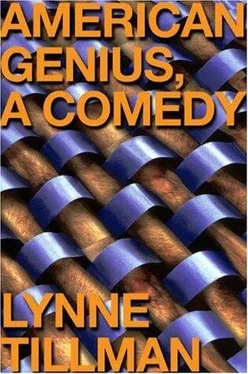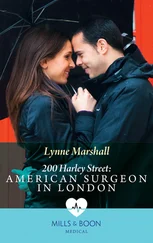— What's that? Spike asks.
— I work small groups at tables or standing up in front of small audiences. I do card tricks, coins, hand/eye magic, and patter is very important.
— Patter? Henry asks.
— Everyone has patter, says Spike, intimately.
— I've got a routine, I talk my talk. Patter's very important, it's part of the art of misdirection. I can't say more, but I can say there's lots of rehearsal, a lot of work goes into my act. But I really can't say more.
The Count and Contesa pay close attention, and she even removes her dark glasses. The table is staring at the Magician, who accepts this matter-of-factly, but then he's used to small audiences and even absorbs our interest with magnanimity, while Contesa leans toward him from across the round table, her palms up, as if to show him her past and future, and her canny eyes resemble crystal balls.
— Do you contact spirits? she asks.
— I don't do seances. I've done a few, but I don't like to. I can. They're too emotional, I can't sleep afterward. I don't do stage illusions. I don't do escapism. I'm not an escape artist.
— Houdini was, she counters.
— Houdini did it for the money, the Magician carefully explains, he was a close-up magician, but he couldn't support his family. That's why I have a day job. There's big money in staged illusions. But I wouldn't do one of those for a million dollars a trick.
— I collect antique timepieces, the Count interjects.
— The spirit world isn't just illusion, Contesa goes on. Houdini and his wife made a pact, they developed some code or other. She did a seance to contact him.
— Actually, she tried to contact him ten times, the Magician says. Houdini was a skeptic, but skeptics need convincing. They're insecure.
— Sex is real, big magic, says the Turkish poet. You think it's so, Helen?
I blushed.
Like the Magician, I wouldn't be buried alive, chained and bound in a coffin, and dropped into the ocean for money or any other reason, but its appeal probably is sexual, since there's the lust to be smothered under mounds of flesh, all senses buried, the brain pressed to do its commanding submerged below layers of skin and fat. Right now I could insert a forgotten word "amaxophobia," the morbid fear of riding in a car or carriage, which is cited in the library's sex manual, but Spike jumps in, relishing his challenge, and, for the delectation of our table, though possibly not to the Magician's taste, she reveals an episode at a sex club, where she discovered her wholesome, strapping massage therapist in the middle of a large, noisy room being whipped, her nipples in steel clips, her ample flesh quivering in pain-filled excitement. Spike hoped that she hadn't been seen watching her, but she may have been, nothing was said, and now during massages, Spike's fantasies are flatter but less humiliating.
— This is no sex to me, the Turkish poet says, almost stricken. It hurts my heart to hear.
— Like bad poetry, says Arthur.
The Turkish poet claps his hands.
— Yes, yes, bad poetry hurts the heart.
— And bad sex, says Spike.
— They're episodes of stupidity, stupidity has no sense or sensation, says Contesa. Sex can be dumb.
— Einstein said, and I quote, "The imagination is more important than knowledge," says the Count.
Contesa glows.
The Count plucks his pocketwatch from his jacket pocket and looks at it with affection, while I'm considering saying I miss my cat or another remark that might establish a point of departure or even misdirection. Last night some of us engaged in an intense discussion about domestic and wild animals who'd performed extraordinary feats, a skunk who unzipped tents and stole food, a cat who turned doorknobs, a wild bird who bathed in a kitchen washbasin, a pet mouse who frowned and smiled, a cat who mothered a parrot, a large dog who lay on its owner and saved her from hypothermia, and I told the story of our family cat who, in addition to her other miraculous feats, was once left alone in our house, whose den had the six Eames chairs and table I loved, which were sold over my protests with the house I also loved, and when she couldn't go out, instead of fouling the floor, she defecated on the drain of my parents' bathtub, after which she tore sheets of toilet paper from the roll and placed them in a mound on top of her unsightly mess, and all of this was especially pleasing to my mother, who nonetheless killed her later. Usually no one is wrong or mistaken about animals to whom an unqualified love is due.
A jarring crash and shrieks disrupt us, erupting from the kitchen, and I jump up, as do several other residents, we run in and discover the kitchen helper on the floor surrounded by broken glasses and crockery, plates, cups, saucers, and near him the head cook is screaming, but when we enter, she claps both hands over her mouth, because the residents are meant to live in peace and quiet here, and no one but we can demonstrate distress, and the head cook must restrain herself on our account. The kitchen helper's hand is cut, his unblemished skin torn, there is a gash, blood on his pants leg, his long legs, and I feel as weak as a kitten drained by fleas. Wobbly, I walk out of the kitchen, hump into someone, experience additional pressure or a tighter grip around my heart, then collapse in a faint on the dining-room floor. I never know where I am when I faint, when the blood rushes from my head, flees, my brain empties, I can feel it until I feel nothing but a lightheaded coolness, and I can only hope my end is similar to fainting, since to die like this would he nearly pleasant. Then, as I awaken on the floor, the coolness leaves, I open my eyes and sense the Count kneeling beside me, with his pocketwatch near his face, he drifts around in soft focus, and I hear him say, "Helen, you lost consciousness for forty or fifty seconds. Are you well enough to sit up? Your friend will be fine, it's not deep, he'll be all right. Tea and cognac will fix you right up."
After I faint or swoon, I must always rush to a sink and splash cold water on the pressure points, wrists, at the pulse, on the neck, the jugular vein specifically, then all over my face, where the skin appears drained and blanched, and, when color returns, with blood to my brain, so do I. I return to the dining room, where, by now, my table, relieved to see me up and conscious, or almost conscious, is all sympathy for a bit, but also showing restraint because they are loath to interfere with me, to my detriment, and also they're ready for dessert, which tonight is chocolate pudding with chocolate chips and fresh whipped cream. I drink black tea and swallow a shot of cognac. This anaglyphic scene reforms and becomes again one room with just four walls and just three dimensions, the chairs and table return to their regular shapes, and the residents' disparate triple noses, eyes, lips, and brows congeal into single features and recognizable faces, my lightheadedness dissipates, a process I'm used to, and then Contesa rises from the table, and, in her spirited manner, announces to the room, first ringing a bell, that she has written a short play or spectacle, and hopes all assembled will attend a dramatic reading of it, but that is our decision, and she will understand our need for solitude, especially after what's happened, looking at me and toward the kitchen, which could be embarrassing but somehow isn't. It is tonight at nine in the Rotunda Room, she declares and sits down again. The tall balding man and disconsolate woman immediately leave, which the demanding man notes, sullenly, as the Turkish poet searches my face for explanation, so it is a moment to appear enigmatic.
"Wait, I'll do a trick for you," the Magician says sharply. He's looking at me. "You wanted to learn about tricks, I'll show you one, and it'll get your mind off it." It, I ask myself, what is it?
Читать дальше












